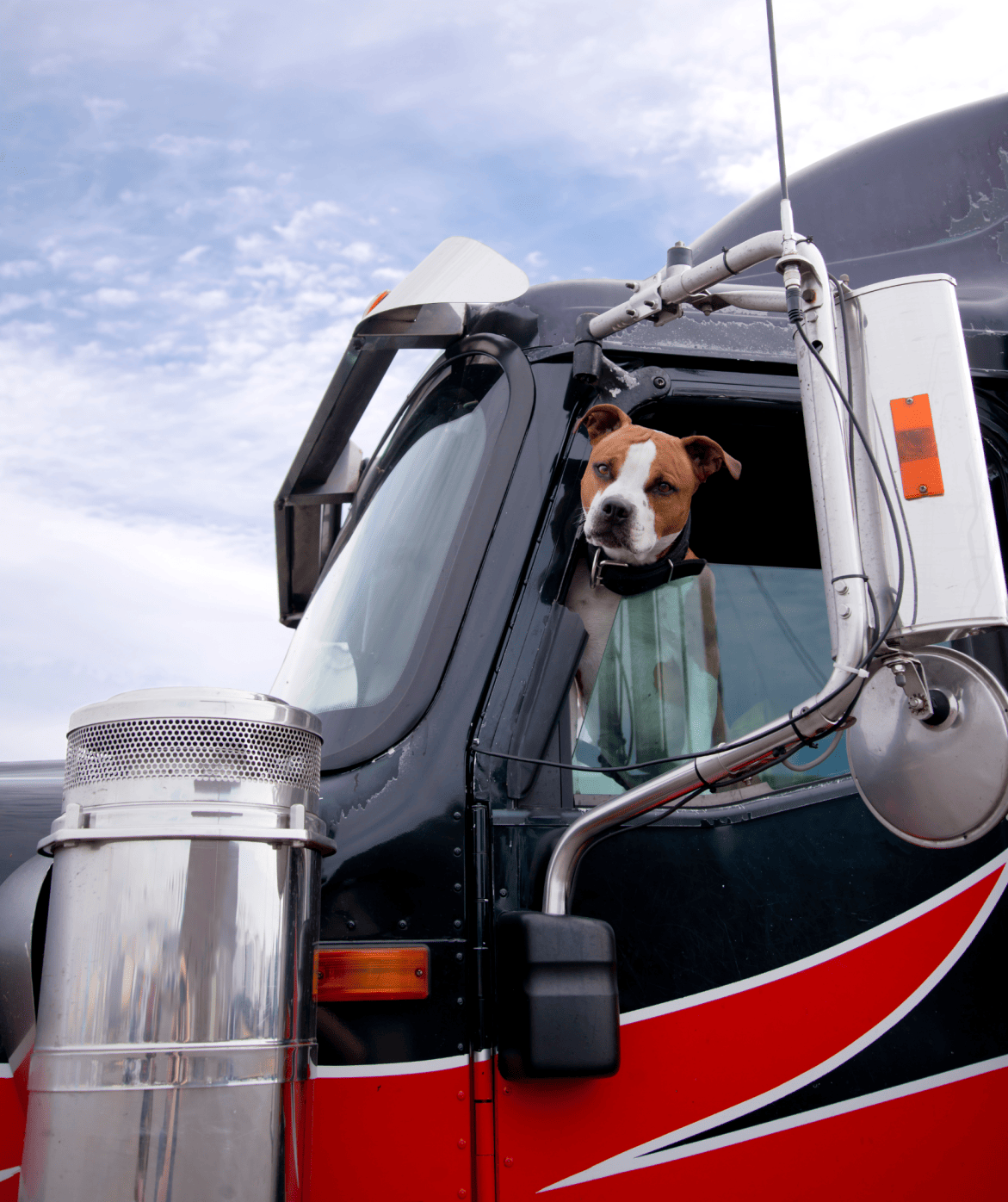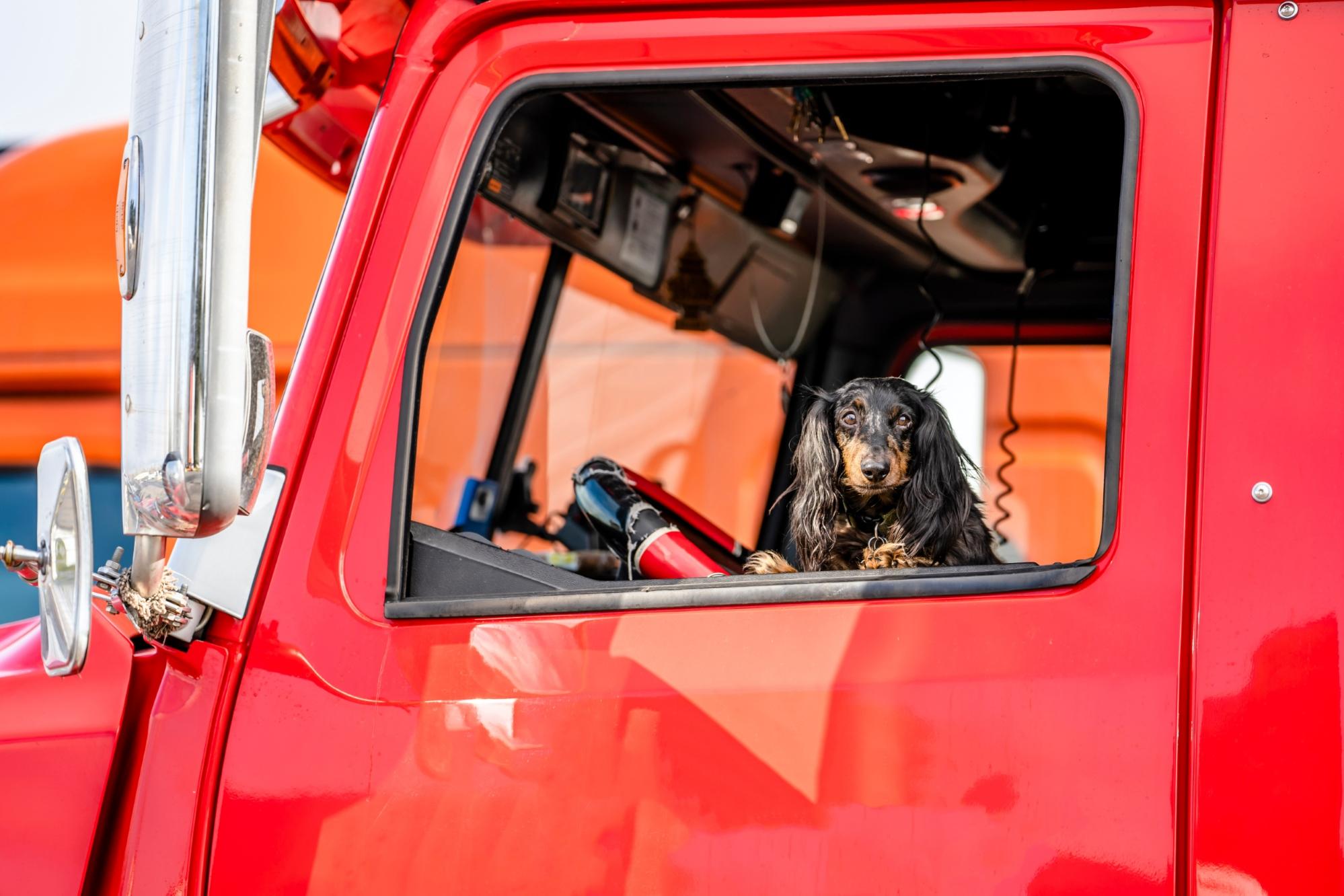Pros and Cons of Having a Pet Companion as a Truck Driver
January 22nd, 2024
By Arrow Truck Marketing

Pros and Cons of Having a Pet Companion as a Truck Driver
Life on the road as a truck driver can be both exhilarating and, at times, lonely. For many drivers, the idea of having a furry companion along for the journey brings a sense of comfort, companionship, and joy. What pets do truck drivers choose and why? Let’s dive into the world of truck drivers and their pets and explore the best choices. We’ll take a look at navigating pet-friendly policies, weigh the pros and cons, and outline essential factors to consider before welcoming a four-legged friend on board your semi-truck.
Thinking about a pet for the road? You’ve come to the right place.
Best Pets for the Road
The road becomes a much more enjoyable place with a companion by your side. But what is the best pet for taking on the road? Dogs, known for their loyalty and protective instincts, are a popular choice among truckers. Cats, with their independent nature, also adapt well to the confined space of a truck cab. Smaller pets like hamsters can also be delightful travel companions, given their space requirements and compatibility with life on the road.
Ultimately, it’s not so much about the animal itself but its compatibility with life on the road. The ideal pet for a trucker should possess characteristics that complement the unique lifestyle of driving a semi-truck. Adaptability is key, as the pet must be comfortable with the confined space of a truck cab and the unpredictability of travel. Loyalty and companionship are invaluable traits, as the whole point is to provide emotional support to the trucker during long hours on the road. A good trucking pet should also be low-maintenance, able to cope with irregular schedules, and not require excessive exercise. Additionally, a calm and relaxed temperament is essential, ensuring the pet remains content in the often-moving, always confining environment of a truck. Ultimately, a great trucking pet is a steadfast companion who enhances the trucker’s journey without causing excess hassle or safety issues.
Navigating Pet-Friendly Policies
Bringing a pet on the road requires an understanding of your trucking company’s policies. While some companies warmly embrace the idea of drivers having furry co-pilots, others may have restrictions. Commonly, companies permit pets like dogs and cats, but it’s essential for drivers to check with their employers regarding the types of pets allowed. Documentation is another crucial aspect; many companies require up-to-date health records and vaccination certificates for the pet. Some may even request behavioral evaluations to ensure the safety and comfort of both the driver and the pet. To ensure compliance with company policies, drivers should communicate transparently with their employers, provide the necessary documentation promptly, and adhere to any guidelines outlined in the pet-friendly policy. Being well-informed and proactive helps you enjoy the companionship of your pet and respect the rules set by the boss.
The Pros and Cons of Trucking with Pets
Having a pet on the road comes with its own set of challenges and rewards. Let’s look at both sides.
Pros
Having a pet, such as a dog or cat, provides constant companionship during the solitary hours of long-distance driving.
Emotional Support. Pets are known to alleviate stress and loneliness. The emotional support boosts the driver’s overall mental well-being.
Routine and Responsibility. Caring for a pet introduces a sense of routine, offering structure to a trucker’s day and creating a homier atmosphere in the cabin.
Increased Physical Activity. Dogs, especially, necessitate regular walks, contributing to the driver’s physical health and safety by encouraging breaks and movement.
Improved Mood. The presence of a pet reduces the monotony of the road and creates a positive driving experience.
Cons
Care and Responsibility. Pets require consistent care, including feeding, walks, and attention, which might be challenging to maintain during a demanding trucking schedule.
Limited Space. The confined space within a truck cabin is limiting for pets and affects their comfort in ways the driver may not be able to accommodate.
Potential Distractions. Pets may become a source of distraction, especially during critical driving moments, posing a potential hazard for truck drivers and pets.
Potential Problem. A pet in the cab means there’s a potential, even if remote, of something unexpected happening that will get things off course. Expecting the unexpected is part of trucking, but a pet adds one more variable to the equation.
Regular Breaks Needed. Truckers with pets need to factor in regular breaks for the pet’s needs, which may negatively impact overall travel time and delivery schedules.
Health and Environmental Factors: Consideration must be given to the health and well-being of the pet, including factors like temperature extremes and exposure to hazards.
Balancing the advantages and disadvantages is crucial for truckers contemplating adding a furry companion to their journeys. Responsible driving must always be the driver’s primary concern.
Factors to Consider Before Getting a Pet
While the idea of having a pet as a road companion is appealing, it’s essential to consider a variety of factors before embarking on this journey. Making a well-informed decision ensures both the driver’s and the pet’s well-being. Here are just a few key considerations:
Compatibility: Different pets have varying needs and temperaments. Consider a pet that aligns with your lifestyle and the constraints of trucking.
Pet-Friendly Policies: Check with your company’s policies regarding traveling with pets. Ensure you are aware of any restrictions or guidelines they have in place.
Comfort: Evaluate the available space in your cabin. Larger animals will struggle in confined spaces, which will affect their comfort and well-being.
Personal Health: Consider any allergies or health conditions you may have that could be exacerbated by having a pet in close quarters.
Routine Care: Understand the time commitment required for caring for a pet, including regular walks, feeding schedules, cleaning, and attention.
Costs: Pets come with associated costs, including food, veterinary care, and potential emergencies. Assess your financial capacity to responsibly care for a pet.
Nature of Routes: Consider the nature of your routes. Some routes may be more pet-friendly, allowing for easier accommodation of a furry companion.
Behavioral Expectations: Ensure your pet is trained and well-behaved. This is crucial for safety and harmonious coexistence in the limited space of a truck cabin.
Contingency Plans: Have contingency plans for emergencies, including access to veterinary services and knowledge of pet-friendly stops along your routes.
Lifestyle Stability: Consider the stability of your lifestyle. Pets are a long-term commitment, and their well-being relies on a consistent and stable environment.
By carefully weighing these factors, you can make a conscious and responsible decision about introducing a pet into your trucking lifestyle.

Are You Ready for a Tail-Wagging Companion?
It’s clear the decision to bring a pet on the road is as unique as the countless miles you cover. Whether you’re greeted by the excited bark of a canine companion or the comforting purr of a feline friend, the road takes on a different hue when shared with a pet.
For many truckers, the positives far outweigh the challenges. The camaraderie, the joy of a wagging tail, and the companionship during long stretches on the highway all add a special kind of richness to the trucker’s life. Yet, as the miles unfold, remember this decision is as personal as the routes you choose.
At Arrow Truck Sales, we wish all our trucker friends safe and happy journeys. If a career in trucking feels overwhelming because of the solitude, a furry companion is absolutely an option and can make all the difference. Weigh the pros and cons, make a smart choice, check with the boss, and you’re on your way.

